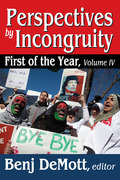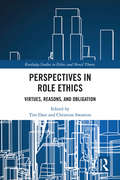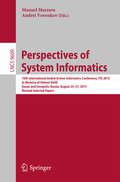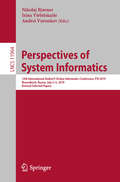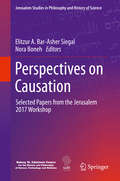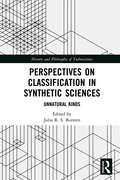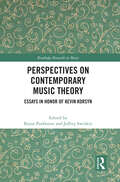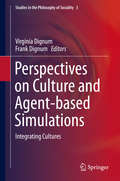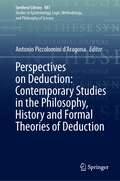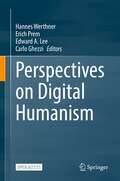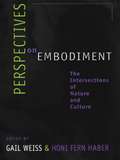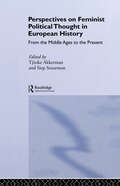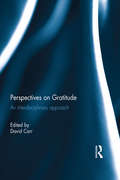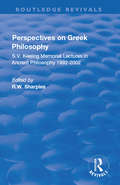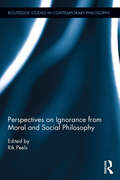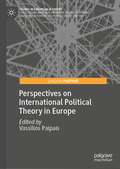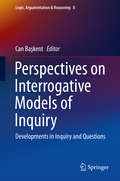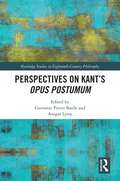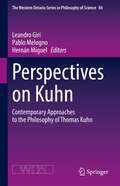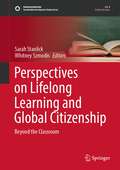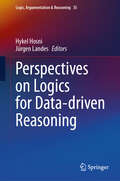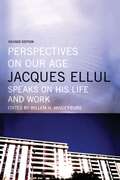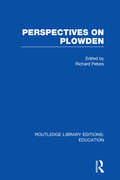- Table View
- List View
Persophilia: Persian Culture on the Global Scene
by Hamid DabashiFrom antiquity to the Enlightenment, Persian culture has been integral to European history. Interest in all things Persian shaped not just Western views but the self-image of Iranians to the present day. Hamid Dabashi maps the changing geography of these connections, showing that traffic in ideas about Persia did not travel on a one-way street.
Perspective as Symbolic Form: An Essay On Infinite Naming (Zone Bks.)
by Erwin PanofskyErwin Panofsky’s Perspective as Symbolic Form is one of the great works of modern intellectual history, the legendary text that has dominated all art-historical and philosophical discussions on the topic of perspective in this century. Finally available in English, this unrivaled example of Panofsky’s early method places him within broader developments in theories of knowledge and cultural change. Here, drawing on a massive body of learning that ranges over ancient philosophy, theology, science, and optics as well as the history of art, Panofsky produces a type of “archaeology” of Western representation that far surpasses the usual scope of art historical studies. <P><P>Perspective in Panofsky’s hands becomes a central component of a Western “will to form,” the expression of a schema linking the social, cognitive, psychological, and especially technical practices of a given culture into harmonious and integrated wholes. He demonstrates how the perceptual schema of each historical culture or epoch is unique and how each gives rise to a different but equally full vision of the world.Panofsky articulates these distinct spatial systems, explicating their particular coherence and compatibility with the modes of knowledge, belief, and exchange that characterized the cultures in which they arose. Our own modernity, Panofsky shows, is inseparable from its peculiarly mathematical expression of the concept of the infinite, within a space that is both continuous and homogenous.
Perspectives by Incongruity: First of the Year
by Benj DeMottDiversity and "perspective by incongruity" dene the approach to changing times in this fourth volume of the First of the Year series. Insights come from interesting minds in unobvious juxtapositions. First's roster of irreverent and holy! regulars includes Amiri Baraka, Bernard Avishai, Uri Avnery, Chuck D, Diane di Prima, Fr. Rick Frechette, Donna Gaines, Lawrence Goodwyn, Roxane Johnson, W.T. Lhamon Jr., Philip Levine, Kanan Makiya, Bongani Madondo, Greil Marcus, Charles O'Brien, Judy Oppenheimer, Tom Smucker, Fredric Smoler, A.B. Spellman, Scott Spencer, Robert Farris Thompson, Richard Torres, David Waldstreicher, and Armond White.Their angles on history and history in the making are enhanced by contributions from new members of First's family of defamiliarizers such as Peter Brown, Wesley Brown, Mark Dudzic, Robert Hullot-Kentor, and Aram Saroyan.Perspectives by Incongruity touches down in Kashmir, Haiti, South Africa, and Indonesia. There's a vital section devoted to the Arab Spring. But the volume homes in on the U.S.A. as well, digging into race and class structures of feeling (and fantasy). It means to comprehend the Obama era in real time. Music is key to Perspectives by Incongruity's offbeat truth-telling. Contributors sound off on Jay Z and Kanye West, mambo and Afropop, Dylan and Coltrane, Sun Ra and Arcade Fire. First's meaning is (as ever) in the mix.
Perspectives in Role Ethics: Virtues, Reasons, and Obligation (Routledge Studies in Ethics and Moral Theory)
by Tim Dare Christine SwantonAlthough our moral lives would be unrecognisable without them, roles have received little attention from analytic moral philosophers. Roles are central to our lives and to our engagement with one another, and should be analysed in connection with our core notions of ethics such as virtue, reason, and obligation. This volume aims to redress the neglect of role ethics by confronting the tensions between conceptions of impartial morality and role obligations in the history of analytic philosophy and the Confucian tradition. Different perspectives on the ethical significance of roles can be found by looking to debates within professional and applied ethics, by challenging existing accounts of how roles generate reasons, by questioning the hegemony of ethical reasons, and by exploring the relation between expertise and virtue. The essays tackle several core questions related to these debates: What are roles and what is their normative import? To what extent are roles and the ethics of roles central to ethics as opposed to virtue in general, and obligation in general? Are role obligations characteristically incompatible with ordinary morality in professions such as business, law, and medicine? How does practical reason function in relation to roles? Perspectives in Role Ethics is an examination of a largely neglected topic in ethics. It will appeal to a broad range of scholars in normative ethics, virtue ethics, non-Western ethics, and applied ethics interested in the importance of roles in our moral life.
Perspectives of System Informatics
by Manuel Mazzara Andrei VoronkovThis book constitutes the refereed proceedings of the 10th International Andrei Ershov Informatics Conference, PSI 2015, held in Kazan and Innopolis, Russia, in August 2015. The 2 invited and 23 full papers presented in this volume were carefully reviewed and selected from 56 submissions. The papers cover various topics related to the foundations of program and system development and analysis, programming methodology and software engineering and information technologies.
Perspectives of System Informatics: 12th International Andrei P. Ershov Informatics Conference, PSI 2019, Novosibirsk, Russia, July 2–5, 2019, Revised Selected Papers (Lecture Notes in Computer Science #11964)
by Nikolaj Bjørner Andrei Voronkov Irina VirbitskaiteThis book constitutes the refereed proceedings of the 12th International Andrei P. Ershov Informatics Conference, PSI 2019, held in Novosibirsk, Russia, in July 2019.The 18 full papers and 3 short papers presented in this volume were carefully reviewed and selected from 70 submissions. The papers cover various topics related to the Mathematics of Computing, Information Systems, Formal Languages, dependable and fault-tolerant Systems and Network, Automata Theory, and much more.
Perspectives on Causation: Selected Papers from the Jerusalem 2017 Workshop (Jerusalem Studies in Philosophy and History of Science)
by Elitzur A. Bar-Asher Siegal Nora BonehThis book explores relationships and maps out intersections between discussions on causation in three scientific disciplines: linguistics, philosophy, and psychology. The book is organized in five thematic parts, investigating connections between philosophical and linguistic studies of causation; presenting novel methodologies for studying the representation of causation; tackling central issues in syntactic and semantic representation of causal relations; and introducing recent advances in philosophical thinking on causation. Beyond its thematic organization, readers will find several recurring topics throughout this book, such as the attempt to reduce causality to other non-causal terms; causal pluralism vs. one all-encompassing account for causation; causal relations pertaining to the mental as opposed to the physical realm, and more. This collection also lays the foundation for questioning whether it is possible to evaluate available philosophical approaches to causation against the variety of linguistic phenomena ranging across diverse lexical and grammatical items, such as bound morphemes, prepositions, connectives, and verbs. Above all, it lays the groundwork for considering whether the fruits of the psychological-cognitive study of the perception of causal relations may contribute to linguistic and philosophical studies, and whether insights from linguistics can benefit the other two disciplines.
Perspectives on Classification in Synthetic Sciences: Unnatural Kinds (History and Philosophy of Technoscience)
by Julia R. S. BurstenThis volume launches a new series of contemporary conversations about scientific classification. Most philosophical conversations about kinds have focused centrally or solely on natural kinds, that is, kinds whose existence is not dependent on the scientific process of synthesis. This volume refocuses conversations about classification on unnatural, or synthetic, kinds via extensive study of three paradigm cases of unnatural kinds: nanomaterials, stem cells, and synthetic biology.
Perspectives on Contemporary Music Theory: Essays in Honor of Kevin Korsyn (Routledge Research in Music)
by Jeffrey Swinkin Bryan ParkhurstKevin Korsyn is a renowned music theorist, musicologist, and pedagogue who has taught at the University of Michigan since 1992. He has published widely and influentially in areas as diverse as Beethoven and Brahms studies, chromatic tonality, disciplinarity and metatheory, history of theory, musical meaning and hermeneutics, poststructuralism (deconstruction, intertextuality, etc.), and Schenkerian theory and analysis. Because of the scope and caliber of his published work, and also his legacy as a pedagogue, Korsyn has had a profound impact on the field of music theory, along with the related fields of historical musicology and aesthetics. This book, a festschrift for Korsyn, comprises essays that constellate around his numerous scholarly foci. Represented in the volume are not only familiar music-theoretical topics such as chromaticism, form, Schenker, and text-music relations, but also various interdisciplinary topics such as deconstruction, disability studies, German Idealism, posthumanism, and psychoanalysis. The book thus reflects the increasingly multifaceted intellectual landscape of contemporary music theory.
Perspectives on Culture and Agent-based Simulations
by Virginia Dignum Frank DignumThis volume analyses, from a computational point of view, how culture may arise, develop and evolve through time. The four sections in this book examine and analyse the modelling of culture, group and organisation culture, culture simulation, and culture-sensitive technology design. Different research disciplines have different perspectives on culture, making it difficult to compare and integrate different concepts and models of culture. By taking a computational perspective this book nevertheless enables the integration of concepts that play a role in culture, even though they might originate from different disciplines. Culture is usually regarded as something vague and qualitative and thus difficult to deal with in a computational and formal setting. Taking a computational approach to culture thus encompasses a twofold risk: taking a too simplistic approach to cultural influence on behaviour; or trying to capture too much, hence not leading to useful computational tools. However, the approaches and insights in this collection show how different perspectives by leading researchers described in thirteen chapters still can form a coherent picture. The book thus illustrates the potential of using computing systems to better understand culture. By describing methods, theories and concrete application results about the integration of cultural aspects into computer systems, this book provides inspiration to researchers of all disciplines alike and presents the start of an interdisciplinary dialogue on culture.
Perspectives on Deduction: Contemporary Studies in the Philosophy, History and Formal Theories of Deduction (Synthese Library #481)
by Antonio Piccolomini D'AragonaThis book provides philosophers and logicians with a broad spectrum of views on contemporary research on the problem of deduction, its justification and explanation. The variety of distinct approaches exemplified by the single chapters allows for a dialogue between perspectives that, usually, barely communicate with each other.The contributions concern (in a possibly intertwined way) three major perspectives in logic: philosophical, historical, formal. The philosophical perspective has to do with the relationship between deductive validity and truth, and questions the alleged conclusiveness of deduction and its epistemic contribution. It also discusses the role of linguistic acts in deductive practice, and provides a cognitive-didactic contribution on how we may learn through deduction. In the historical perspective, the contributions discuss the ideas of some major historical figures, such as Bolzano, Girard, Gödel, and Peano. Finally, in the formal perspective, the mathematics of deduction is dealt with mainly from an intuitionistic-constructivist or proof-theoretic point of view, with focus on “ecumenic” or internalistic approaches to logical validity, on the nature and identity of proofs, and on dialogical setups.Chapter [14] is available open access under a Creative Commons Attribution 4.0 International License via link.springer.com.
Perspectives on Digital Humanism
by Hannes Werthner Carlo Ghezzi Edward A. Lee Erich PremThis open access book aims to set an agenda for research and action in the field of Digital Humanism through short essays written by selected thinkers from a variety of disciplines, including computer science, philosophy, education, law, economics, history, anthropology, political science, and sociology. This initiative emerged from the Vienna Manifesto on Digital Humanism and the associated lecture series. Digital Humanism deals with the complex relationships between people and machines in digital times. It acknowledges the potential of information technology. At the same time, it points to societal threats such as privacy violations and ethical concerns around artificial intelligence, automation and loss of jobs, ongoing monopolization on the Web, and sovereignty. Digital Humanism aims to address these topics with a sense of urgency but with a constructive mindset. The book argues for a Digital Humanism that analyses and, most importantly, influences the complex interplay of technology and humankind toward a better society and life while fully respecting universal human rights. It is a call to shaping technologies in accordance with human values and needs.
Perspectives on Embodiment: The Intersections of Nature and Culture
by Gail Weiss Honi Fern HaberFirst published in 1999. Routledge is an imprint of Taylor & Francis, an informa company.
Perspectives on Feminist Political Thought in European History: From the Middle Ages to the Present
by Tjitske Akkerman and Siep StuurmanSpanning six centuries of political thought in European history, this book puts the ideas of thinkers from Christine de Pizan to Simone de Beauvoir in the broader contexts of their time. This intriguing collection of essays shows that feminism is not a varient of modern radical discourse but a mode of analysing the issues of authority, power and virtue that have been at the heart of European political thought from the middle ages.
Perspectives on Gratitude: An interdisciplinary approach
by David CarrPsychologists, philosophers, theologians and educationalists have all lately explored various conceptual, moral, psychological and pedagogical dimensions of gratitude in a rapidly expanding academic and popular literature. However, while the distinguished contributors to this work hail from these distinct disciplines, they have been brought together in this volume precisely in recognition of the need for a more interdisciplinary perspective on the topic. While further developing such more familiar debates in the field as whether it is appropriate to feel grateful in circumstances in which there is no obvious benefactor, whether it is proper to feel grateful to those who have benefited one only from a sense of duty and whether it makes sense to be grateful if so doing colludes with injustice, the essays in this collection explore a wide variety of fresh conceptual, psychological and moral issues. For example, in addition to identifying some new moral paradoxes about gratitude and seeking a generally more morally discriminating approach to gratitude education, relations are explored between gratitude and humility, forgiveness and appreciation and the religious and spiritual dimensions of the concept are also given much overdue attention. By drawing together serious academic engagement with the study of gratitude and a serious attempt to undertake this within an interdisciplinary perspective, Perspectives on Gratitude will be of value to academics and graduate students in the fields of philosophy, psychology and theology, as well as other research-based disciplines.
Perspectives on Greek Philosophy: S.V. Keeling Memorial Lectures in Ancient Philosophy 1992-2002 (Routledge Revivals Ser.)
by R. W. SharplesTitle first published in 2003. In commemoration of the philosophical interests of Stanley Victor Keeling, the annual lectures in his memory highlight the interest and importance of ancient philosophy for contemporary study of the subject. This volume brings together the Keeling lectures from leading international figures in ancient and modern philosophy, presented between 1992 and 2002. Including contributions from Bernard Williams and Martha Nussbaum, lectures range across topics such as 'Intrinsic Goodness', Necessity, Fate and Determinism and Quality of Life, extending from Plato through Aristotle to the Stoics. Edited and with a preface by R. W. Sharples.
Perspectives on Ignorance from Moral and Social Philosophy (Routledge Studies in Contemporary Philosophy)
by Rik PeelsThis edited collection focuses on the moral and social dimensions of ignorance—an undertheorized category in analytic philosophy. Contributors address such issues as the relation between ignorance and deception, ignorance as a moral excuse, ignorance as a legal excuse, and the relation between ignorance and moral character. In the moral realm, ignorance is sometimes considered as an excuse; some specific kind of ignorance seems to be implied by a moral character; and ignorance is closely related to moral risk. Ignorance has certain social dimensions as well: it has been claimed to be the engine of science; it seems to be entailed by privacy and secrecy; and it is widely thought to constitute a legal excuse in certain circumstances. Together, these contributions provide a sustained inquiry into the nature of ignorance and the pivotal role it plays in the moral and social domains.
Perspectives on International Political Theory in Europe (Trends in European IR Theory)
by Vassilios PaipaisThis book offers a timely exploration of the still burgeoning field of International Political Theory (IPT). IPT is approached in this volume not merely as a subfield at the margins of the discipline of International Relations (IR) but rather as a key dimension of theorising international relations that challenges disciplinary, theoretical, methodological, and geographical boundaries and inseminates other theoretical IR traditions. Chapters in this volume approach IPT as a theoretical tradition that emphasises and interrogates the philosophical, historical, ethical, normative, institutional, and aesthetic dimensions of international relations and world politics. In so doing, they explore IPT as a European theoretical tradition to stress that, paradoxically, it is only by provincializing Europe and its intellectual traditions that one may finally appreciate what is truly universal in them. This is a refreshingly different take on IPT sure to be of interest to students and scholars of IPT, IR and political theory.
Perspectives on Interrogative Models of Inquiry
by Can BaşkentThis book explores the two major elements of Hintikka's model of inquiry: underlying game theoretical motivations and the central role of questioning. The chapters build on the Hintikkan tradition extending Hintikka's model and present a wide variety of approaches to the philosophy of inquiry from different directions, ranging from erotetic logic to Lakatosian philosophy, from socio-epistemologic approaches to strategic reasoning and mathematical practice. Hintikka's theory of inquiry is a well-known example of a dynamic epistemic procedure. In an interrogative inquiry, the inquirer is given a theory and a question. He then tries to answer the question based on the theory by posing questions to nature or an oracle. The initial formulation of this procedure by Hintikka is rather broad and informal. This volume introduces a carefully selected responses to the issues discussed by Hintikka. The articles in the volume were contributed by various authors associated with a research project on Hintikka's interrogative theory of inquiry conducted in the Institut d'Histoire et de Philosophie des Sciences et des Techniques (IHPST) of Paris, including those who visited to share their insight.
Perspectives on Kant’s Opus postumum (Routledge Studies in Eighteenth-Century Philosophy)
by Ansgar Lyssy Giovanni Pietro BasileThis book offers new perspectives on the theoretical elements of the Opus postumum, Kant’s project of a final work which remained unknown until eighty years after his death. The contributors read the OP as a central work in establishing the relation between Kant’s transcendental philosophy, his natural philosophy, practical philosophy, philosophy of religion, metaphysics, and his broader epistemology. Interpreting the OP is an important task because it helps reveal how Kant himself tried to correct and develop his critical philosophy. It also sheds light on the foundational role of the three Critiques for other philosophical inquiries, as well as the unified philosophical system that Kant sought to establish. The chapters in this volume address a range of topics relevant to the epistemological and theoretical problems raised in the OP, including the transition from the Metaphysical Foundations of Natural Science to physics as an answer to a deficiency in critical thought; the notion of ether and, more specifically, its transcendental deduction; self-affection and the self-positing of the subject; and the idea of God and the system of ideas in the highest standpoint of transcendental philosophy. Perspectives on Kant’s Opus postumum will be of interest to upper-level students and scholars working on Kant.
Perspectives on Kuhn: Contemporary Approaches to the Philosophy of Thomas Kuhn (The Western Ontario Series in Philosophy of Science #84)
by Leandro Giri Pablo Melogno Hernán MiguelThis book presents essays and commentaries that continue on Thomas Kuhn’s work from where he left off at the time of his death. Contrary to other books, this volume picks up the gauntlet to develop, from a contemporary perspective, some points that can be improved in the light of recent findings and conceptualizations in metatheory. Thus, this work pays a visit to the classical Kuhnian landscapes, but rather proposing interpretations, it takes them as the starting point to go further. One hundred years after Kuhn's birth, the editors and authors rekindle the passion and interest that have always surrounded the work of the great Boston philosopher and historian.
Perspectives on Lifelong Learning and Global Citizenship: Beyond the Classroom (Sustainable Development Goals Series)
by Sarah Stanlick Whitney SzmodisThis book lays the groundwork for the future of global citizenship, and it discusses where we are now, where to go from here, and how all of this fits into a lifelong learning context. It incorporates case studies, meta-narratives, and empirical studies to support cosmopolitanism through a lifelong learning lens and is a must read for educators, activists, non-governmental organizations, civil society, and community organizations. The framing for this book is with the United Nations Sustainable Development Goal 4 in mind: ensuring inclusive and equitable quality education and promoting lifelong learning opportunities for all, with the intent that all learners will acquire the knowledge, skills, and attitudes necessary to promote “sustainable lifestyles, human rights, gender equality, promotion of a culture of peace and non-violence, global citizenship and appreciation of cultural diversity and of culture’s contribution to sustainable development” (UN Sustainable Development Goal, target 4.7). It is through this lens that this book showcases the work of researchers, practitioners, civil society, and thought leaders in global citizenship for lifelong learning. While this tension between nationalism and cosmopolitanism exists, the wheels of globalization still turn and shape our local, national, and global connections. Through this exploration, this book lifts up examples of global citizenship education done well, across the age spectrum, and in a variety of contexts. The binding factor is the core values, ethics, and moral structure of a world in collaboration toward its larger human and ecological thriving. It unpacks complex topics such as ethical and cultural relativism, accountability and responsibility in a global world, decolonial education and unmaking ideas of “development”, and ethical models for community-based global learning and engagement. What voices are missing in the discussion of global learning and global citizenship education?
Perspectives on Logics for Data-driven Reasoning (Logic, Argumentation & Reasoning #35)
by Hykel Hosni Jürgen LandesThis book calls for a rethinking of logic as the core methodological tool for scientific reasoning in the context of a steadily increasing emphasis on data-centered science. To do so it provides a state-of-the-art presentation of the role logic can have in making the most of the current opportunities while making explicit the key challenges opened up by the data-driven age of scientific research. Particular attention is given to the following four core fields and applications: Reasoning with correlations (medical, life-science applications); logics for statistical inference (machine learning, and societal applications thereof); reasoning with evidence (defining good evidence); causal reasoning (forensic reasoning). The book collects contributions from key logicians, methodologists and scientists. This multidisciplinary perspective benefits both scientists and logicians interested in data-driven science. Scientists are introduced to logics that go beyond classical and thus are applicable to reasoning with data; Logicians have a change to focus on the potential applications of their methods and techniques to pressing scientific problems. This book is, therefore, of interest to scientists and logicians working on data-centered science.
Perspectives on Our Age: Jacques Ellul Speaks on his Life and Work
by Jacques EllulOriginally broadcast on CBC Radio's Ideas as a series of interviews, Jacques Ellul's first-person approach here makes his ideas accessible to readers looking for new ways of understanding our society, and also gives unique new insight into Ellul's life, his work, and the origins and development of his beliefs and theories. Jacques Ellul, historian, theologian, and sociologist, was one of the foremost and widely known contemporary critics of modern technological society.
Perspectives on Plowden (Routledge Library Editions: Education)
by Richard PetersThe Plowden Report, Children and their Primary Schools (1967), had a huge impact on education in the latter 20th century, but at the time was labelled as left-wing, and of no practical use to the problems of education in the 1960s. The contributors to this volume were all concerned with the educational thinking of the Plowden Report, and its appropriateness or otherwise to the educational needs of the day. In quarters where the Plowden Report was treated as an authoritative textbook, the views in this volume provide a valuable critique.


